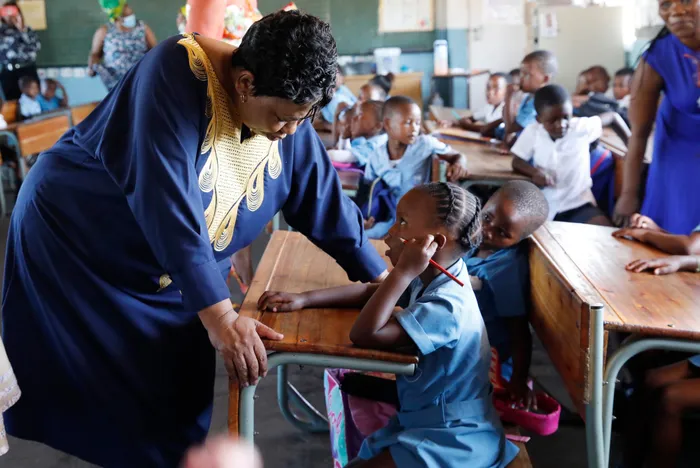Tap Continent’s mineral wealth with decolonised education

Picture: Doctor Ngcobo Basic Education Minister Angie Motshekga visited Nkonkoni Primary School in uMlazi to monitor the reopening of schools in January. South Africa’s education system is shaped in a manner that continues systematic subjugation and none of the education systems implemented have proved to be ideal, says the writer.
By Laurika Mashaba
Africa is well equipped with wealth through its natural resources. However, it remains poor and constantly claims the title of being a “dark continent”.
Political leaders who come into power constantly give civilians false hope they will bring an end to persisting socio-economic issues such as poverty.
However, this is short-lived because as soon as they warm their seats, they succumb to corruption and focus on filling their stomachs. Despite African countries having received their independence from their colonisers, it seems as though that is something that happened in vain.
This is because the First World countries continue to take from Africa. African countries have maintained relationships with their former colonisers and continue to eat from the palm of their hands. This happens through the continuous dependence on First World countries to secure loans and aid towards economic development through the International Monetary Fund and the World Bank.
It is clear Africa’s dependence on the sources takes away its independence as the funding comes with conditions that keep the Continent stagnant and poverty-stricken. Another form of persisting colonisation in African countries is the education system.
South Africa’s education system has improved from what it was during the apartheid era, which was in the form of Bantu education. Bantu education was an inferior education system made strictly for black people.
The education system did not equip black people with skills that would allow them to pursue professions such as law or engineering. Instead, they were equipped with skills that enabled them to do manual labour to work in a white man’s house as a tea girl or a garden boy.
The apartheid regime shaped the system in a manner in which black people could serve the “white masters” and maintain inferior positions. This is a clear indicator black people were denied access to the valuable education white people had. Even though there was a change in the education system after the apartheid government was voted out, black people faced de facto segregation.
White schools were privatised and made inaccessible to the ordinary black person, considering the demographic positioning of the schools and the high fees charged. This is while black schools remained in rural areas with a difficult teacher-learner ratio to manage. This makes it hard for effective teaching and learning to happen in schools.
In 1997, Outcomes Based Education (OBE) was introduced as the new education system after an end was put to Bantu education. It was removed in 2008, being replaced by Curriculum and Assessment Policy Statement.
However, none of the systems has proved ideal for the Africa we ought to work towards. South Africa’s education system is shaped in a manner that continues systematic subjugation. The curriculum is impractical and does not serve the country in terms of making African people take up spaces in areas that would help improve development, for example refining our gold and oil.
Schools do indeed equip children with literacy and numeracy skills, which are a necessity. However, that is not where it should end. An education system that serves Africa should be established. Africa is rich in minerals and agriculture, with 65 percent of the world’s land that can be cultivated. It would be effective to have an education system that prepares pupils to work in the identified areas to create wealth and help the continent develop through its strengths.
The US, Australia and Canada have the top mining universities in the world when it would have been ideal for Africa, as a Continent dominating in minerals, to be leading in the field. The governments of African countries also have a responsibility of investing towards the education system to improve this field rather than buying services from First World countries.
The exporting of raw materials only to purchase a finished product in return is also a costly practice that African states could eliminate by equipping themselves with the necessary skills. Agriculture, mining and manufacturing basics should be taught in schools to give pupils a foundation and open their options to exploring these.
Furthermore, the governments of each African country should look at where their strengths lie and how they can use them to get more income/ investments through exports. Africa could learn from the Chinese education system that teaches pupils how to produce goods from a young age.
This has helped the country increase the amount of production, thus improving their trade relations and bringing income into their country. Even though it is debated, China is an emerging world power because of its global positioning through its production.
China is able to produce quality goods and trade with multiple countries at a lesser price. This can be a valuable lesson for African states. African states need a practical curriculum that opens the people to directly contributing to the socioeconomic development of their respective states.
For example, making agriculture a compulsory subject in schools would equip learners to branch into subsistence and commercial farming, which could help reduce poverty as they could grow crops to feed their families and sell. That would enable citizens from all walks of life to be active participants towards a better Africa. Additionally, it would open doors to unity and the revival of Ubuntu because there would be an interdependence in communities and opening of economic markets as people would be trading among themselves, and African states among each other.
Mashaba is a researcher at the 4IR and Digital Policy Research Unit (4DPRU) in the Department of Politics and International Relations at the University of Johannesburg. She writes in her personal capacity.